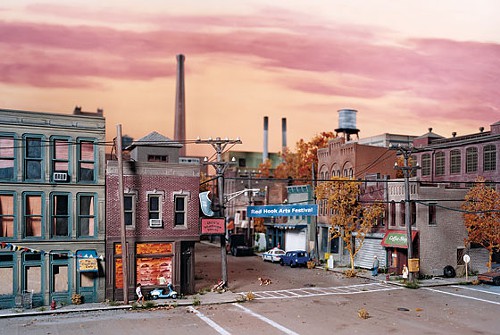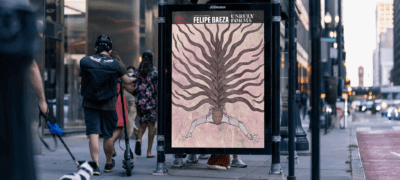How to Tell If Your Neighborhood Is Being Gentrified: A Simple Guide
- Lori Nix c/o New York Magazine
Do you ever find yourself wondering if you are part of the problem or part of the solution? The problem, of course, being a lack of orchids in your local florist’s window. The solution, just as obviously, being gentrification. Well, there are easy ways to tell if your neighborhood has been selected for gentrification. If you look up into the sky, do you see glass-fronted condominiums blocking out the sun? Does your local bodega sell almond milk? Chalky, tongue-coating, but totally addictive almond milk? When you point out to a neighbor and fellow dog-owner that she has failed to pick up the healthy pile of shit that her dog left in the middle of the sidewalk, does she turn and yell at you, “Fuck you, hippie. It’s my goddamn neighborhood. I can do what I want. Go back to where you come from.”? If your neighbors call you a hippie, then the answer is clear. Your neighborhood is definitely gentrified and is probably Windsor Terrace, where the more long term residents don’t know the difference between hippies and hipsters. Adorable, right? Don’t you just want to eat them right the fuck up?
What? Does it sound reductive to call adults “adorable” just because they’re not familiar with the difference between a hippie and a hipster? Maybe. Maybe it does. But then, isn’t that the point of identifying signifiers of whether or not a neighborhood has been “gentrified”? Isn’t the point to be reductive and obtuse? No? Then what the fuck is The New York Times doing with their latest article on gentrification trends, “‘Organic’ Dry Cleaners Can Serve as Barometer of Gentrification”? Oh, just being the Times? I see.
Yes, the same paper who just the other day let us all know about the brand new trend of rich, white people moving out of the city and into the suburbs, is now letting us know what’s new in the world of New York City gentrification. You see, “‘We’ve gone way beyond organic food, and Starbucks is passé,’ Mitchell Moss, a professor of urban policy and planning at New York University, said of two prototypical signposts that your rent is about to rise. ‘Organic cleaners have become a barometer.’” So, wait. I can’t use the presence of a Starbucks anymore to let me know that my neighborhood has arrived? Way to keep up with the trends, Mitchell Moss. You sound so on top of things.
But where has the trend of organic cleaners been spotted? The Times helpfully points out that “in neighborhoods like Greenpoint, Brooklyn, some customers prefer that dry cleaners forswear potentially hazardous chemicals.” Oh, “some customers.” Let me guess which customers, probably the wealthy, new arrivals, right? Probably the ones who actually care about the environment and their own health and have the extra money to spend on debatably effective things like organic food and green dry cleaners. Probably them, right? Well, sure. Because, let’s face it. They’re better people. I mean, that’s the point of all this, right? Gentrifying makes things better. I’m pretty sure that’s what the Times is trying to tell us. Because why else point out that while “search engines and user-review Web sites like Yelp show the highest concentration of green-washed dry cleaners in more affluent neighborhoods” there are plenty of places in NYC where people still clean their clothes with inorganic chemicals. Gross, right? But true. For example, “there appear to be vast bare patches, especially in the Bronx and on Staten Island, and calls to dry cleaners in many areas to inquire about eco-friendly options yielded the same answer, various versions of ‘Huh?’”
“Huh?” How adorable! People in the Bronx and Staten Island have never even heard of organic dry cleaning! I mean, can you even call what they do living, at this point? They don’t even know they’re stuck in the cave. They are who Plato was talking about. While the rest of us, those who choose to bravely gentrify and lead the charge of installing organic dry cleaners on every corner, we live in the light. We transcend the allegory. We are enlightened. Come out of the cave. Join us.
Follow Kristin Iversen on twitter @kmiversen
You might also like 





















